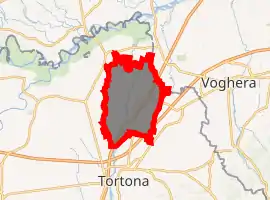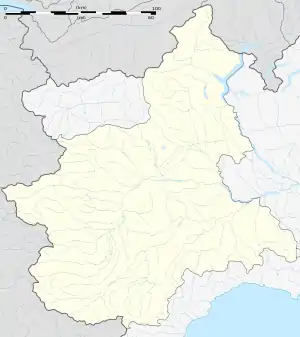Castelnuovo Scrivia
Castelnuovo Scrivia is a comune (municipality) in the Province of Alessandria in the Italian region Piedmont, located about 90 kilometres (56 mi) east of Turin and about 20 kilometres (12 mi) northeast of Alessandria.
Castelnuovo Scrivia | |
|---|---|
| Comune di Castelnuovo Scrivia | |
 Coat of arms | |
Location of Castelnuovo Scrivia 
| |
 Castelnuovo Scrivia Location of Castelnuovo Scrivia in Italy  Castelnuovo Scrivia Castelnuovo Scrivia (Piedmont) | |
| Coordinates: 44°58′N 8°52′E | |
| Country | Italy |
| Region | Piedmont |
| Province | Alessandria (AL) |
| Frazioni | Gerbidi, Ova, Pilastro, Secco |
| Government | |
| • Mayor | Pierangelo Luise |
| Area | |
| • Total | 45.4 km2 (17.5 sq mi) |
| Elevation | 82 m (269 ft) |
| Population (2007)[2] | |
| • Total | 5,508 |
| • Density | 120/km2 (310/sq mi) |
| Demonym(s) | Castelnovesi |
| Time zone | UTC+1 (CET) |
| • Summer (DST) | UTC+2 (CEST) |
| Postal code | 15053 |
| Dialing code | 0131 |
| Website | Official website |
History
The city was fortified around 500 CE by order of Theoderic the Great, king of the Ostrogoths, and in 722 it was enlarged by the Lombard king Liutprand. An ally of Frederick Barbarossa in his war against the Lombardy communes, it took part in the destruction of Tortona in 1115, obtaining certain privileges in exchange. Around 1300 Castelnuovo became part of the Duchy of Milan.
In 1570 it changed name from Castelnuovo di Tortona to Castelnuovo Scrivia, and become a fief of the Marini family and, after their extinction in 1778, of the Centurione family.
Main sights
- The parish church, in Romanesque style, dates to the 12th century although restored in the 16th and 19th century. It has a portal with medieval lions sculptures, lunette and capitals executed in Frederick Barbarossa times. The interior, on a nave and two aisles, houses a 15th-century fresco with the Madonna of the Misericordia and four 11th-century capitals from the old pieve. Moreover, in the "Corpus Domini" chapel, there is a 16th-century painting by Alessandro Berri, representing "The Last Supper". It is a copy of the famous mural painting "The Last Supper" by Leonardo da Vinci.
- Palazzo Pretorio (castle of the Torriani and Bandello families) has an ogival portico, with mullioned windows. The upper storey has 11th- and 16th-century frescoes. The castle has a crenellated tower, 39 metres (128 ft) high.
- Church of Sant'Ignazio (17th century)
- Palazzo Centurione (17th century), in Genoese style. It houses the city museum
Notable people
- Matteo Bandello (c.1480–1562), writer.
- Cesare Zerba (1892–1973), Roman Catholic cardinal.
- Vittorio Malosti (1900–1945). Artisan, killed one month after the end of World War II. Tha location of his body and the identity of his murderers were never revealed.
Twin towns
 Port-Sainte-Marie, France
Port-Sainte-Marie, France Santa Domenica Talao, Italy
Santa Domenica Talao, Italy
References
- "Superficie di Comuni Province e Regioni italiane al 9 ottobre 2011". Istat. Retrieved 16 March 2019.
- All demographics and other statistics: Italian statistical institute Istat.